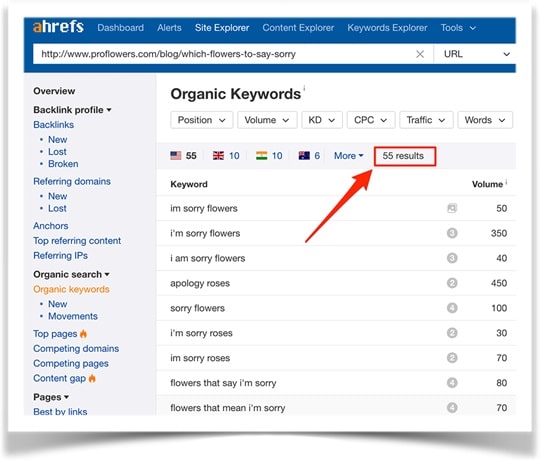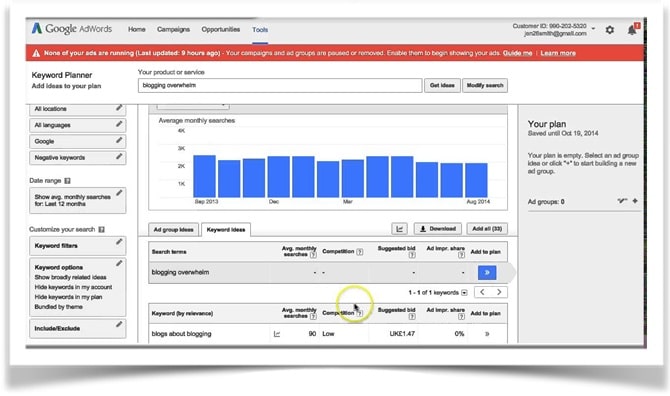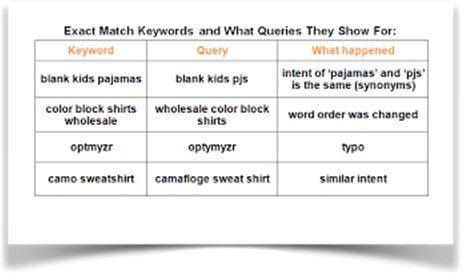While the term “keyword research” has been made popular by the SEO community, identifying and building a keyword-based content strategy is imperative across all digital marketing & communication. To explain this, let’s take a look at what does the word “keywords” really mean and why researching them should be so important to anybody with a digital presence.

Keywords are search strings users are likely to type when they are searching for your service / product category. Not only are they indicative of customer intent (exploration vs.purchase), they also shed light on the possible customer segments a brand has the potential to attract . Sugar-free bran muffins vs. Gooey chocolate chip cake indicate 2 very distinct consumer categories.
It is important to understand that Google reads the “intent” of the search string types against an exact word match. So synonyms, phrases describing and approximating the content are also deemed as relevant and included by default.
Today a customer interacts with a brand through a complex maze of interconnected journey cycles across both online and offline platforms. Brands need to deliver a consistent and cohesive brand experience across touch points for which we need a common content and therefore keyword strategy. Think about it… if 62% of your search traffic comes from “ 10 minute recipes for healthy school snacks”, you want to try and leverage that learning in your emails or social posts as well.
And frankly, it’s got only 2 key steps.
Include them in all communication. Cross link between them. Be creative in finding similar phrases and words that mean the same thing. Dig deep into what each phrase could also mean or be interpreted as.
Most people cannot realistically rank for “Best cheeseburger or best marketer” and even if they did, 99% of the traffic generated by such a keyword would be a waste. Why, you ask? Read on.
Performing keywords are keywords that your website is already ranking on search engines for ( Usually rank between 1-15 for different permutations) and therefore keywords that are bringing you your existing customers and are the current bread and butter of your business. A proven customer base and your lifeline.

To get this list, I suggest opting for almost any SEO toolkit from Ahrefs, MOZ, SEMrush, etc. that gives you a complete list along with traffic (absolute and percentage of whole) for your own and any other website/competition that you would like to find this information for. Start with your own and compare with close competition.
Keywords or search strings are used by customers are every step of their journey cycle - be it exploration of a related service or comparison of prices between shortlisted services and finally for problem resolution / support once a purchase has been made. Ideally a brand should be visible at every single step of this cycle though keywords closest to the purchase naturally have the highest possibility of conversion.
I would recommend inviting your complete team including senior management in a room and identifying the highest high value touch points and the underlying customer intent /segments (and the search strings / keywords that best map into them). You can then run these ideas through a tool like Adwords planner or even any of the toolkits that you have subscribed to like SEMrush, Moz, Ahrefs and feed in the combinations aggregated above. You will get many more ideas along with their traffic, competition and other valuable details.

You cannot rank for every single keyword that you want. If a page is strong for a certain keyword, it may not be as strong for another. Attempting to be relevant to every viable customer segment ( and therefore rank for every possible keyword) is one of the most common mistakes marketers make.
To make the final selection consider the following.
It’s important to understand that most people review SEO performance in terms of organic traffic growth and keyword rank performance so keeping that in mind I suggest the creation of 3 separate lists.
Immediate Wins ( 3-6 months) These are keywords for which you already have a reasonably high position and which are likely to move up in a short period of time. It is important to understand that progress on these will automatically give a boost to others which are not on this list as well. Plus it will give you a meaningful inflection in traffic which is good for morale (and increased budgets if needed for more creative activities).
Strategic focus( 6-12 months) These are keywords that you may not be ranking for at this time (due to lack of sufficient content or sub optimal tagging or focus) but are closely aligned to the core business and therefore words you think you deserve to rank for. In making a separate list with a different timeline, you manage expectations better.
Aspirational (12 or more months) These are typically keywords that while relevant, are TOO generic or highly competitive. These require substantially greater effort and are best parked while you build smaller wins on the ones which are more achievable. Having these in a list allows you yo use them when possible for content without necessarily needing to show ranking progress on them as part of your SEO project.
Once you have found the keywords that you want to rank (better) for, the next step is to ensure that you have a keyword-relevant, goal aligned page to bring home the visitors to.

It’s important to understand that Google will factor session time/bounce from the page to decide your rank for that keyword the next time it shows up. So it is NOT enough to bring a person to a page through keyword stuffing or some other SEO hack, you need to be able to KEEP the visitor on the page long enough to signal relevance and protect the rank you have worked so hard to achieve. Side benefit: this relevance will also feed into your quality score and boost PPC efforts.
Designing a great landing page is somewhat outside the scope of this article but you should check out Rand Fishkin’s video on “Should My Landing Page Be SEO-Focused, Conversion-Focused, or Both? - Whiteboard Friday”. It’s a great resource to clarify your concepts.
Lastly these are some tips that you may want to keep in mind as part of your SEO and content strategy.

( Note : This does NOT apply to brand / proper noun related misspellings )

I hope that this guide helps you get started on researching identifying the right keywords for your business. You can also read our TOP 10 ADVANCED SERP FEATURES on more insights on ranking.